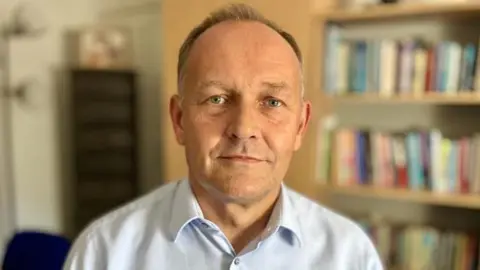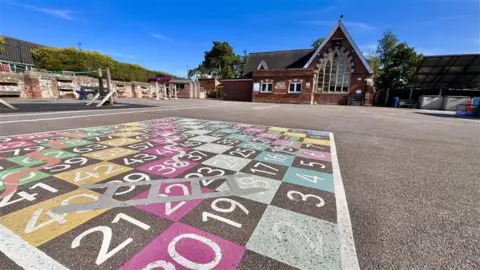Shorter school day has minimal impact, says trust
 Martin Giles/BBC
Martin Giles/BBCA school trust that is testing having a shorter school day on Fridays believes pupils will have more time with teachers in the classroom.
Following consultations, teachers at Reedham Primary and Winterton Primary in Norfolk will use a Friday afternoon for planning and professional development time.
If successful, it could be rolled out in all Consortium Trust schools, including a further nine in Suffolk, by September 2027.
Andrew Aalders-Dunthorne, the trust's chief executive, said: "The intention of this programme is to make sure children have teachers in front of them for more time than they already do now."
Since the Covid-19 pandemic, the schools already have an earlier start to the day and a shorter lunch break.
"Because we have extended the school day after the Covid pandemic to 08:30 BST starts and we have maintained that all the way through, so the reduction actually is quite minimal," said Mr Aalders-Dunthorne.
While the national guidance is 32.5 hours of teaching a week, the chief exec said the trust was closer to 34 hours at the moment, which meant teachers could finish in the classroom at 12:15 each Friday when the trial starts.
He said: "The key reason is to use the finite resources of the trust more effectively, which is largely around staffing and finance to ensure that we are using what we do have effectively.
"One of the challenges for small rural primary schools is the ability to release teachers to keep up to date with their training... all teachers are entitled to a 10% reduction in their timetable to allow them to participate in planning and preparation - we have found this very disruptive in small primary schools."
 Martin Giles/BBC
Martin Giles/BBCOn a Friday afternoon, a childcare provision put in place would be focused around the curriculum for working parents until 15:15 which the chief exec hoped would minimise the impact on working families.
"The division is pretty equally split. Some parents have come to us and they are really pleased... they welcome the opportunity to start their weekend early," he said.
"We have other parents quite rightly expressing issues around potentially lost learning time and the impact on working families."
The trust said it had sent letters and run consultations with parents ahead of introducing the trial In November.
Mr Aalders-Dunthorne said if it had no positive impact on pupil outcomes, behaviours and attendance, it would not be carried forward.
He said: "We are absolutely passionate of making sure that primary schools in rural communities are seen as community assets and we will do everything within our power to protect them and this trial is one of those pieces of innovation which we think could support those schools moving forward."
Follow Norfolk news on BBC Sounds, Facebook, Instagram and X.
